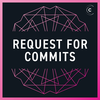Working in Public
Nadia Eghbal is back and this time she’s talking with us about her new book Working in Public. If you’re an old school listener you might remember the podcast we produced with Nadia and Mikeal Rogers called Request for Commits. If you weren’t listening then, or can’t remember…don’t worry…the back catalog of Request for Commits is still online and subscribe-able via all the podcast ways. That podcast is still getting listens to this very day!
Obviously we go way back with Nadia…and having a chance to now talk with her through all the details of her new book Working in Public, this was a milestone for this show and Jerod and I. We talked through the reasons she wrote the book in the first place, Nadia’s thoughts on the future of the internet and the connection of creators to the platforms they build their followings on, and we also talk about the health of projects and communities and the challenges we face internet-at-large as well as right here in our backyard in the open source community.

